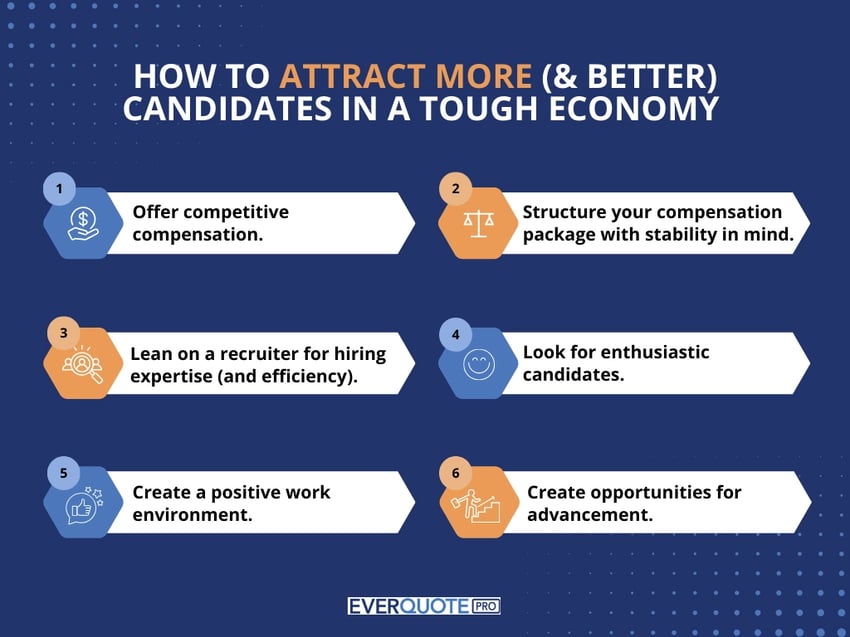- Home»
- EverQuote Pro Blog»
- Hiring Insurance Producers During Trying Times

How can you, as an insurance agency owner or manager, successfully hire and retain new agents in today’s economy?
If you’re experiencing a lack of qualified candidates for open positions, no-shows for scheduled interviews, or—worst of all—new hire ghosting, you’re not alone. The labor market is challenging right now for many companies looking to hire, and it’s affecting most industries, insurance certainly included.
So what can you do to attract better talent? We talked to an expert recruiter to bring you the most up-to-date advice for hiring insurance producers in 2023 and beyond.
Hiring Insurance Producers: 6 Things You Can Do To Attract More (& Better) Candidates In A Tough Economy

1. Offer competitive compensation.
There’s no getting around it: Competitive compensation attracts top talent. For agency owners who feel their finances are already stretched thin enough, this news isn’t exactly comforting.
While $15-$16 per hour historically seems like adequate compensation for staff members just starting out, this is unfortunately not the case anymore. Three years ago this number would have sufficed, but conditions have changed rapidly. You might be tempted to offset a lower base pay rate with promises of high commission bonuses (like every other agency claims), but this won’t always attract the talent you think it will. Candidates are hearing the same thing from all commission-based employers.
When in doubt, research salaries for comparable positions in your area, or reach out to a recruiter for help building a desirable compensation package. It does help to offer more than the industry average.
2. Structure your compensation package with stability in mind.
As you plan your job listing, think carefully about how you want to structure your compensation. As we just discussed, you’ll need to offer enough money to keep qualified candidates, but how you offer that money can be just as important.
Let’s say, for instance, a candidate comes across two job posts for very similar positions.
One offers $15-$16 per hour as a base rate, but has the potential for “generous” commission, up to a possible $100,000 per year. The other job offers a borderline livable wage at $20 per hour as a base rate, but has the opportunity to earn $75,000 per year with commission. Most candidates in a tough economy will choose the latter “stable” second position.
When given the choice to pick which candidate pool will have the greater breadth and depth, all agents we surveyed choose the latter of the two. Why? Because, they know that is where the majority of people are going to apply. So agents' options are to either keep trudging through the slim pool to find a candidate who hasn’t found their self worth or purpose yet; or to open it up to a greater candidate pool with immediate options available to them. The more time that passes with an open seat the more money agents will lose.
Many agents are worried about candidates being complacent on that borderline, but higher, livable wage. These agents need to be in the mindset of ‘quick to hire quick to fire’. If someone is eating up your base and not producing for the agency your options are to keep reinvesting your resources in their training , or you need to let them go.
Here is the simple math: If you’re an agent offering $30,000 annually, but you book your primary demand of finding a more quality and experienced person with an annual salary of $40,000, the difference is $10,000 annually which equates to $800 per month, $200 per week.
When do you know if someone isn’t going to work out? Two weeks? Three weeks? A month…? Most agents tell us they know in a month or less. My true question is: in these trying times is $800, or less an investment worthy of fishing out higher quality candidates?
Note that this preferred pay structure is very different from how it used to be even just three or four years ago. Traditionally, insurance agencies offered lower base rates and higher commission rates that incentivized agents to work hard to make sales. Today, the job market is so tough, many companies have flipped that model on its head; now candidates want to be paid just for showing up. It’s not right or wrong, it just is the way it is.
While it may be tempting to stick with your tried-and-true commission structure, chances are you’ll lose candidates to other companies offering higher base salaries while you’re getting the same results you don’t want.
Some agents even utilize what's called a graduated commission plan structure. The core concept being you offer a higher base with a lower commission starting, but as a team member becomes more confident in their skill sets and starts producing more, you offer the option of decreasing their base and increasing their commission at every commission payout. If the candidate wants more stability and prefers the higher base while you pocket their compensation in the name of stability, have at it. After time has gone by and the candidate sees they are consistently losing commission every month, nature will take its course and they will choose the option where you want them to be.
Either they fit into your plan, or you are letting them go for lack of production.
3. Lean on a recruiter for hiring expertise (and efficiency).
Be honest with yourself: Do you truly have the spare time and energy to devote to writing job listings, sorting through resumes, reaching out to candidates, and conducting interviews with minimal results?
With the scarcity of qualified talent responding to job ads these days, it can take one or two people working full time to find a great candidate. When you’re already short-staffed, that’s time and manpower you can’t afford to lose.
Recruiters have their fingers on the pulse of what job candidates want. They can use this expertise to find a list of candidates for you quickly, so you don’t have to spend the time and manpower researching salaries, writing and rewriting your job listings, and conducting interviews.
A great recruiter can also take the emotion out of the equation and help you objectively source the best talent for the job. An effective recruiter will act as your ‘buffer’ person requesting peoples attendance at interviews, after a proper vetting process. Don’t fall into the old trap of calling these people yourself, or having your top producers lose production by contacting candidates. Have you ever felt you were starting off wrong by calling yourself? Pleading for candidates to show up to YOUR interview? Having your top producer, or manager, imploring for them to show? You are starting the power dynamic wrong. Let prospects feel like they are doing the recruiter a favor by showing up. The agency owner now gets to be the one accepting them into their organization, which provides the best power dynamic.
Chances are, the stress of needing to fill your vacant position will lead you to make impractical decisions that can haunt you down the line. Maybe the person you choose right off the bat doesn’t fit in with your office culture, or perhaps he leaves after two weeks to take a job elsewhere for a better salary.
Or, maybe you’re having trouble finding someone because you’re always looking for that “wow” factor. When the “wow” is nowhere to be found, you find yourself dissatisfied with your prospects. This can make hiring a new agent more of a chore than it needs to be, taking weeks or months when it should have gone much faster.
4. Look for enthusiastic candidates.
At the end of the day, who is more useful to you: a candidate with a glowing resume of qualifications who quits after a short period of time looking for the next and best, or a candidate who meets 60–70% of your skill sets but has the drive and desire to sell, or service insurance?
Unless you get very lucky, you’ll likely have better results searching for enthusiastic, dedicated people who might not look perfect on paper rather than holding out for your perfect candidate to come along. You can train the hard skills your new hire lacks and bring them up to speed on best practices much easier than you can foster enthusiasm where there is none to start with.
5. Create a positive work environment.
Making your initial hire is only part of the battle. Recent statistics show that brand new insurance agents stick with their jobs only about 50% of the time. This means you could find the (seemingly) perfect person and then lose them right away, costing you time and money.
You’ve already made sure your salary and pay structure are attractive, but you’ll still have trouble if you don’t address the other half of the picture.
A bad work/life balance or a negative culture within your workplace can outweigh even the best of compensation packages. On the other hand, a positive environment can make a person want to stay even if the financial grass looks greener elsewhere.
Keep this in mind when you’re managing your employees! No one wants to be micromanaged or heavily criticized. Finances may be tight and stress may be high, but keeping a positive attitude and encouraging strong communication in the workplace will go a long way toward helping you retain new hires.
If you can build a reputation for having a great work environment, you may even pick up some new talent that left their previous high-stress jobs for healthier, happier conditions.
6. Create opportunities for advancement.
Not everyone these days wants to land a stable job and then coast for the rest of their career. If you can promise a clear pathway of advancement and provide valuable training and skill development opportunities, you’ll attract the people most likely to pursue continual growth.
Also remember that if you hire a person who meets about 60–70% of your expectations on paper (but has an amazing attitude, and has the desire/drive to be with YOU!) your training opportunities will be the last piece of the puzzle that can make or break their success! You can train for skill sets, but you can never train desire.
Once you hire your new agents, start them off on the right foot with leads from EverQuote.
Nothing boosts positive attitudes and job satisfaction quite like the thrill of early success. Put a list of hot leads from EverQuote in front of your brand new agents, and they’ll be on their way to becoming your most valued assets in no time.
Unlock predictable growth with EverQuote.
Our representatives are standing by to help you succeed.
Call 844-707-8800
Weekdays, 9AM-5PM (ET)
Call 844-707-8800
Weekdays, 9AM-5PM (ET)
Accelerate your growth.
Complete the form below or just call 844-707-8800 to learn how we can help you achieve your goals.
By clicking "Get Started", I consent by electronic signature to being contacted by EverQuote, including by automatic telephone dialing and/or an artificial or prerecorded voice (including SMS and MMS - charges may apply), regarding EverQuote for Agents, even if my phone number is listed on a Do Not Call Registry. I also understand that my agreement to be contacted is not a condition of purchasing any goods or services, and that I may call (844) 707-8800 to speak with someone about EverQuote for Agents.
By clicking "Get Started", I affirm that I have read and agree to this website’s Privacy Policy and Terms of Use, including the arbitration provision and the E-SIGN Consent.
* Mandatory fields
 Product Overview
Product Overview Blog
Blog FAQs
FAQs Webinars
Webinars eBooks & Resources
eBooks & Resources